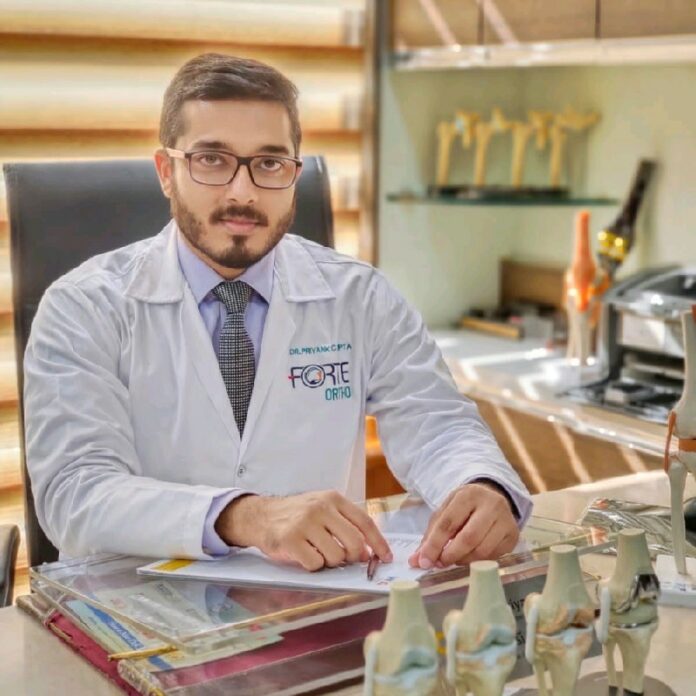Dr. Priyank Gupta, MS (Ortho), Sr. Consultant Joint Replacement Surgeon & Head of the Sports Injury and Arthroscopy Dept, HCG Hospitals, Ahmedabad
Orthopedic conditions affect millions of people worldwide, but the impact on women often goes unnoticed. Women’s musculoskeletal health faces unique challenges and considerations that deserve special attention. Below are some specific orthopedic conditions that women commonly encounter, the challenges they pose, and the solutions available to promote better orthopedic health in women.
Unique Challenges Faced by Women:
Orthopedic conditions in women can have various causes, and understanding these factors is crucial for effective prevention and treatment. Here are some of the primary causes for orthopedic conditions in women:
Hormonal Changes: Hormonal fluctuations throughout a woman’s life can impact her musculoskeletal health. Estrogen plays a key role in maintaining bone density. Reduced estrogen levels during menopause can lead to accelerated bone loss, increasing the risk of osteoporosis and fractures.
Osteoporosis: A Silent Threat Osteoporosis is a significant concern for women, especially as they age. Women’s bones tend to be smaller and less dense than men’s, making them more susceptible to fractures. Hormonal changes, such as menopause, further exacerbate this risk. Regular bone density screenings and adequate calcium and vitamin D intake can help manage and prevent osteoporosis.
Pregnancy and Childbirth: Pregnancy and childbirth impose significant physical demands on a woman’s body. The added weight and shifts in a woman’s center of gravity can strain the musculoskeletal system, leading to conditions like back pain and pelvic pain. Hormones, such as relaxin, can cause ligaments and joints to loosen, potentially resulting in discomfort.
Menstrual and Gynecological Disorders: Some gynecological and menstrual disorders, such as polycystic ovary syndrome (PCOS) and endometriosis, can cause chronic pain, which may lead to altered movement patterns and musculoskeletal issues.
Autoimmune Conditions: Certain autoimmune conditions, like rheumatoid arthritis, are more prevalent in women. The exact cause of this gender disparity is not fully understood, but both hormonal and genetic factors likely contribute. Rheumatoid arthritis can cause joint inflammation, pain, and deformities.
Gender Bias: Gender bias in healthcare can be a significant cause of delayed diagnosis and treatment in women. Women’s orthopedic symptoms are sometimes dismissed or attributed to psychological factors, hindering access to timely and appropriate care.
Sedentary And stereotypic Lifestyle: A sedentary lifestyle can contribute to orthopedic conditions in women. Limited and stereotypic activities in households along with lack of physical activities can lead to repetitive stress injuries, muscle weakness, joint stiffness, and weight gain, all of which increase the risk of musculoskeletal problems.
Solutions for Better Orthopedic Health:
Education and Prevention: Empowering women with knowledge about orthopedic conditions and their risk factors is crucial. Public health campaigns should emphasize the importance of a balanced diet rich in calcium and vitamin D, regular weight-bearing exercise, and maintaining a healthy lifestyle to prevent osteoporosis.
Prenatal and Postpartum Care: Healthcare providers should incorporate orthopedic assessments into prenatal and postpartum care. Early identification of musculoskeletal issues during pregnancy can help develop tailored interventions to minimize discomfort and prevent long-term complications.
Access to Specialized Care: Efforts should be made to ensure women have equal access to specialized orthopedic care. Training healthcare professionals to recognize and address gender bias is essential in promoting prompt diagnosis and appropriate treatment.
Multidisciplinary Approach: Orthopedic conditions in women often requires a multidisciplinary approach. Collaboration between orthopedic surgeons, rheumatologists, physical therapists, and other specialists can provide comprehensive care tailored to a woman’s unique needs.
Orthopedic conditions in women are a significant healthcare concern that deserves more attention and dedicated research. Women face unique challenges due to factors such as bone density, hormonal changes, and gender bias in healthcare. However, with education, prevention, early intervention, and equal access to specialized care, we can mitigate these challenges and promote better orthopedic health in women. It is crucial for healthcare professionals, policymakers, and society as a whole to work together to address these issues and ensure that women receive the orthopedic care they deserve.























